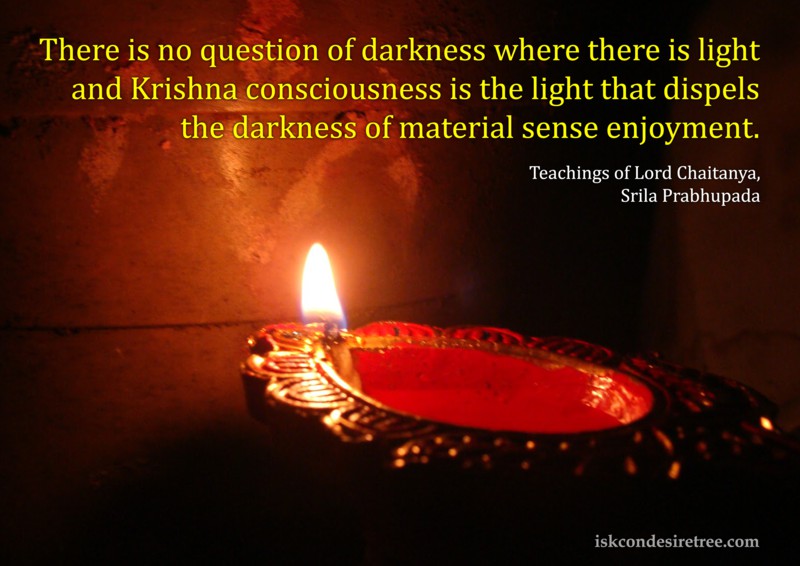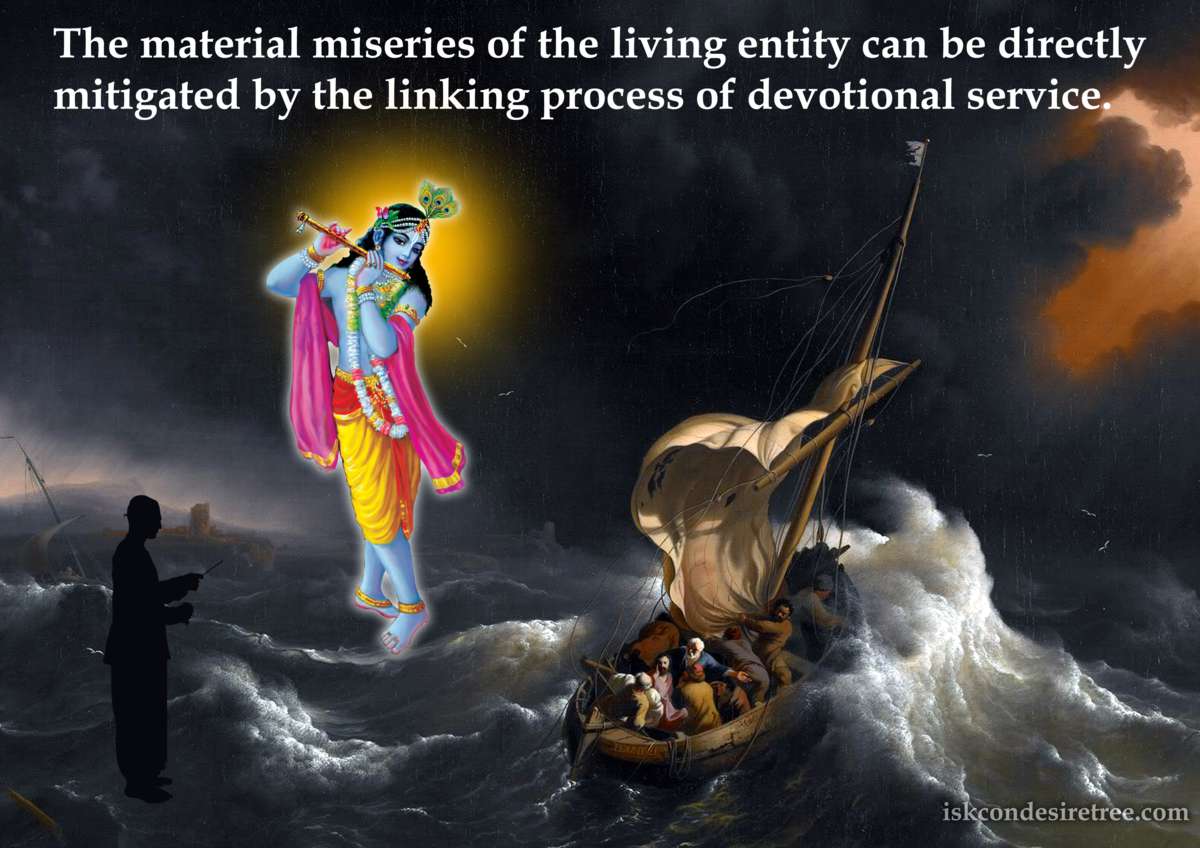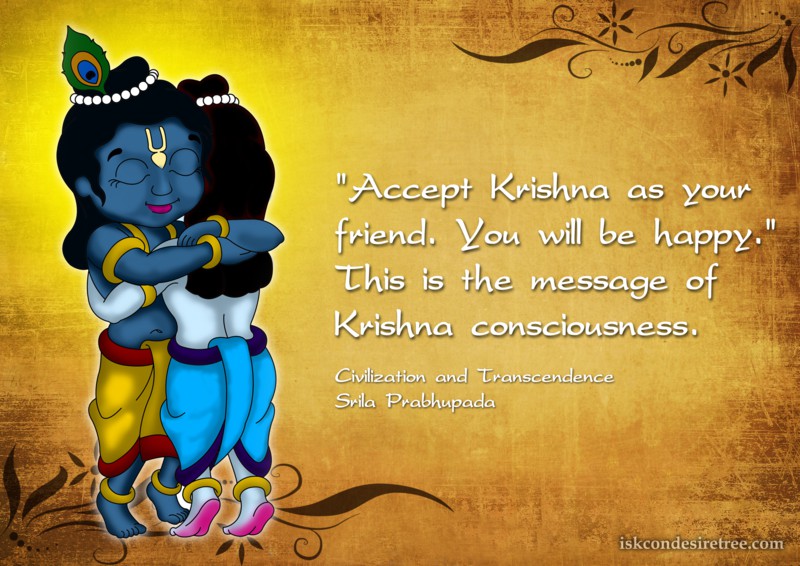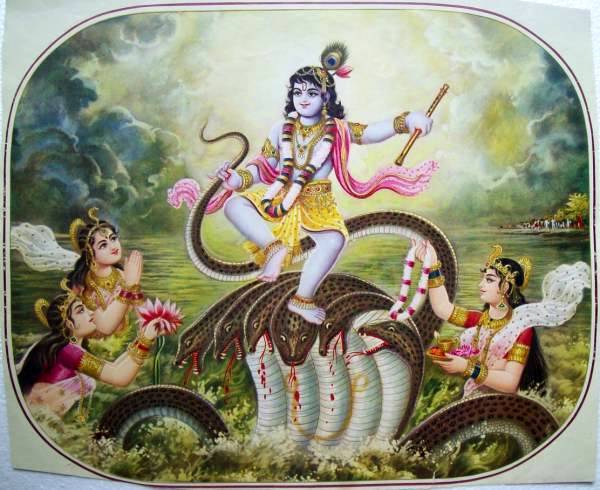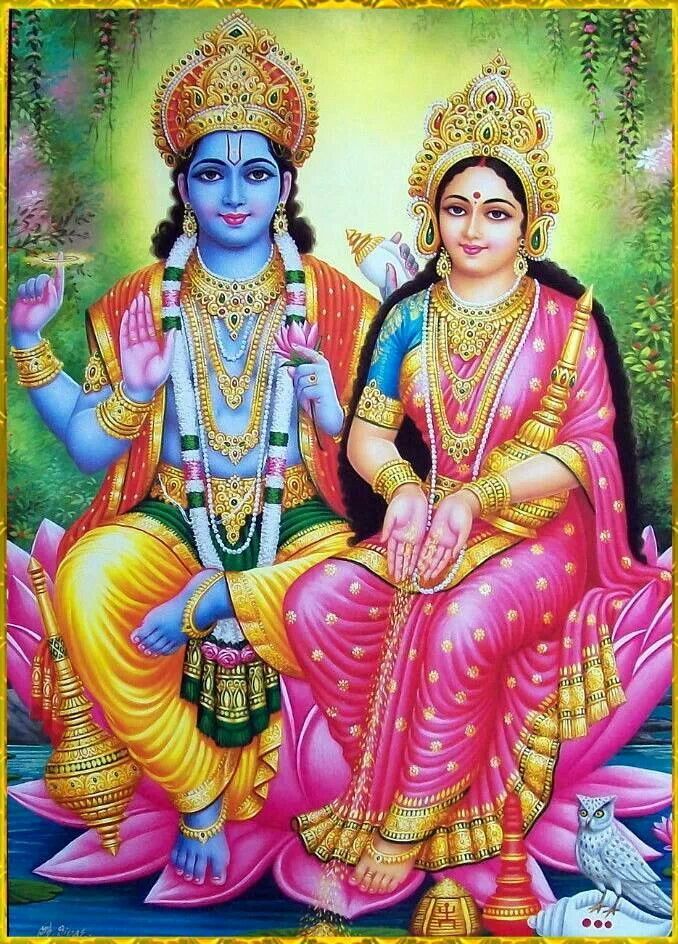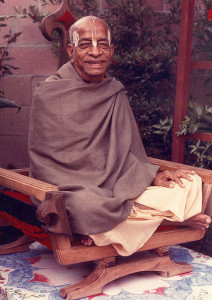Hare Krishna.
28th July, 2015. Gurgaon.
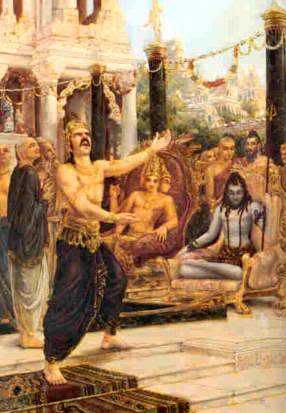
I continue to hear the most amazing seminar given by HG Srimati Mataji on ‘demons in Krishna’s pastimes and the anarthas they represent’. four days back I heard a beautiful interactive discussion during the seminar with Srimati Mataji, HG Madhavananda Prabhuji and other very realised, and fortunate, devotees.
This particular discussion was part of ‘Krishna kills Kamsa’. The reference of pastime of Dakṣa and lord Siva came to discuss the anartha of pride, coming from karma and jnana.
Here is the relevant section from Srimad Bhagavatam to refresh that incident which led to Daksa cursing lord Siva.
When Daksa, the leader of the Prajäpatis, entered that assembly, his personal bodily luster as bright as the effulgence of the sun, the entire assembly was illuminated, and all the assembled personalities became insignificant in his presence. Influenced by his personal bodily luster, all the fire-gods and other participants in that great assembly, with the exceptions of Lord Brahmä and Lord Siva, gave up their own sitting places and stood in respect for Daksa.
Daksa was adequately welcomed by the president of the great assembly, Lord Brahmä. After offering Lord Brahmä respect, Daksa, by the order of Brahmä, properly took his seat.
Before taking his seat, however, Daksa was very much offended to see Lord Siva sitting and not showing him any respect. At that time, Daksa became greatly angry, and, his eyes glowing, he began to speak very strongly against Lord Siva. All sages, brahmanas and fire-gods present, please hear me with attention, for I speak about the manners of gentle persons. I do not speak out of ignorance or envy. Siva has spoiled the name and fame of the governors of the universe and has polluted the path of gentle manners. Because he is shameless, he does not know how to act. He has already accepted himself as my subordinate by marrying my daughter in the presence of fire and brahmanas. He has married my daughter, who is equal to Gäyatri, and has pretended to be just like an honest person. He has eyes like a monkey’s, yet he has married my daughter, whose eyes are just like those of a deer cub. Nevertheless he did not stand up to receive me, nor did he think it fit to welcome me with sweet words. I had no desire to give my daughter to this person, who has broken all rules of civility. Because of not observing the required rules and regulations, he is impure, but I was obliged to hand over my daughter to him just as one teaches the messages of the Vedas to a Sudra. He lives in filthy places like crematoriums, and his companions are the ghosts and demons. Naked like a madman, sometimes laughing and sometimes crying, he smears crematorium ashes all over his body. He does not bathe regularly, and he ornaments his body with a garland of skulls and bones. Therefore only in name is he Siva, or auspicious; actually, he is the most mad and inauspicious creature. Thus he is very dear to crazy beings in the gross mode of ignorance, and he is their leader. (SB 4.2.5-15)
“Daksa then cursed Lord Siva. Unable to tolerate this, Nandishvara, one of Lord Siva’s principal associate cursed Daksa and all the brahmanas present. Then, as a reaction the sage Bhrgu cursed the followers of Lord Siva.”
Brainstorm -1
The sage Maitreya said: When such cursing and counter cursing was going on between Lord Śiva’s followers and the parties of Dakṣa and Bhṛgu, Lord Śiva became very morose. Not saying anything, he left the arena of the sacrifice, followed by his disciples. (SB 4.2.33)
Srila Prabhupada writes in his purport for the above verse : Here Lord Śiva’s excellent character is described. In spite of the cursing and counter cursing between the parties of Dakṣa and Śiva, because he is the greatest Vaiṣṇava he was so sober that he did not say anything. A Vaiṣṇava is always tolerant, and Lord Śiva is considered the topmost Vaiṣṇava, so his character, as shown in this scene, is excellent. He became morose because he knew that these people, both his men and Dakṣa’s, were unnecessarily cursing and counter cursing one another, without any interest in spiritual life. From his point of view, he did not see anyone as lower or higher, because he is a Vaiṣṇava. As stated in Bhagavad-gītā (5.18), paṇḍitāḥ sama-darśinaḥ: one who is perfectly learned does not see anyone as lesser or greater, because he sees everyone from the spiritual platform. Thus the only alternative left to Lord Śiva was to leave in order to stop his follower, Nandīśvara, as well as Bhṛgu Muni, from cursing and counter cursing in that way.
Brainstorm -2
People’s association with karma and jnana is the result of attachment born from the prejudices of one’s nature that are produced from past karma and jnana…Karmis and jnanis disrespect Vaishnavas only due to this attachment for prejudices…Offenses at the feet of sadhus is due to being proud of one’s karma and jnana…(Such) worldly attachment is contrary to acceptance of Krishna’s undisputed supremacy, and it therefore does not allow the unfortunate living entity to fully surrender to the Lord. (Srila Bhaktivinoda Thakura’s Sri Bhaktyaloka, “Sanga-tyaga”)
Srimati Mataji then asked the devotees to share there realisation or understanding from the above hearing.
Devotee 1: She shared how when she read the same pastime in Harivamsa Purana there was no mention of how Sati gave up her body and how Siva was offended and how it is given in complete detail in Srimad Bhagavatam. And without these details one could miss the whole point from this pastime. So we are very fortunate to have Srimad Bhagavatam and Prabhupada commentaries.
Srimati Mataji then recounted the same day’s morning lecture which a Sanyasi, I couldn’t get the name, gave at the temple. Maharaj compared Srimad Bhagavatam to the other puranas. Maharaj stated that a major difference between other puranas and Bhagavata Purana is that the Bhagvata purana is concerned only with glorification of Krishna and His devotees. This is a very common thing which is happening throughout the Bhagavatam. Where as there are different emphasis in other puranas, they basically talk about God, they are not talking about Krishna and His associates. In Bhagavatam we get the essence of all things.
The devotee then shared how so many people who have read shastra they keep on arguing about what they read, how their own understanding is right, I know this and I have read that…. but it is only after reading Bhagavatam does one get complete understanding and knowledge.
Srimati mataji added that in the teachings of Lord Kapila Deva in SB 3.29, Lord Kapila states that devotional service is never contaminated but the people who perform are! And they can actually perform it in eighty one different ways, eighty one different modes. (SB 3.29.10). Mataji said this is where the quality of humility comes in.
Srimati Mataji said that these days humility is going out of the window, and we can see how it is going out. Mataji asked ‘Why in the Vedic times, in the gurukul, students would clean everything, they will clean the toilets, they will clean their ashram, wash their own clothes – didn’t send them to a Dhobi. Why ? Because if we want the knowledge to manifest in our heart in a pure and simple way then there has to be humility. And by doing those menial services we imbibe that mood. That we are not someone special. Not like everyone else can clean the ashram and I can read a book! not like that. Mataji said that’s how we see that the real sadhus in Vrindavan they don’t have cleaners. They do everything themselves, they wash their own clothes, they don’t have cooks. I am Thakurji’s servant… I am living here as a servant….servant does these things…servant cleans the house…servant cooks for Thakurji, this is the mood.
Devotee 2: She stated that her understanding from the above is that its Pride which leads one to his downfall. Daksa is expecting respect from Siva, similarly if we have this kind of expectation that people should respect me then it is a sure sign that we will fall down.
Srimati mataji : I really like the input given by Bhaktivinoda Thakura about this attachment to karma and jnana. Daksha was really like a karmi, a first class karmi! So his whole analysis of Siva is through those lenses, Siva doesn’t follow rules and regulations, doesn’t take his bath, and all this stuff. He is looking at him through karma yoga.
Devotee 1 : And Daksa may be he thinking that Siva is making his daughter fall down by not following all the rules, he is not taking bath and all, whereas Daksha had trained his daughter with such high standards!
Devotee 3: This devotee shared that she liked the first devotee’s point of Bhagavatam being so nice and we being so fortunate. She shared how in her initial days in ISKCON she had no ‘ruchi’ (taste) for reading Bhagavatam. Then one prabhuji told her that for increasing attachment, reading Bhagavatam, if we offer one Tulasi to Bhagavatam then Krishna becomes pleased because He is non different from Bhagavatam! And if you offer Tulasi every day then ‘ruchi’ will come. The devotee shared how she started doing it and she started getting taste. Within a short time she not only developed a ‘ruchi’ for bhagavatam but was also received association so many devotees who were all Bhagavatam lovers. Hari Bol !
Madhavanada Prabhuji : Srila Prabhupada writes that both his men and Dakṣa’s, were unnecessarily cursing and counter cursing one another, without any interest in spiritual life. Prabhuji quoted Srila Bhaktivinoda Thakura, who stated that, when people cultivate ‘information-collection’, they cultivate ‘jnana’, they cultivate ‘karma’, some behavioral patterns, without cultivating service to the Vaishnavas, then what happens is that they think that’s spiritual life. And they think that they have become a judge of other people. Rather than they are trying to serve guru, it doesn’t mean that we should not read Bhagavatam- Prabhupada wanted every devotee to read it. But it is one thing to read Bhagavatam as a service to Prabhupada but many other people in the west, we used try to kind of ‘master’ a book. Prabhuji stressed that we can’t ‘master’ Bhagavatam, we can serve the Bhagavatam by serving ‘bhakt’ (devotee) Bhagavat, by preaching, by reading something and trying to help devotees with it.
Prabhuji cautioned that if we just read Bhagavatam only to gather some information, and not doing service, then the result is that we have something but what it turns into is pride! Prabhuji said that’s what it seemed to have happened here, Daksa was seeing that Siva is not auspicious, he wears skulls , doesn’t take bath and this and that. By some point of view of Shastra we can say that, the skulls are very inauspicious, not taking bath is very inauspicious and they have all this information. But because they are not doing service to the Vaishanavas they can’t understand it and they get involve in unnecessary quarrel!
Prabhuji said without service one may think that I am doing the same thing as this senior devotee. I am reading , he is reading, I am chanting, he is chanting but there is a difference in their mood. That devotees is doing it as a service to his guru. And if I am not doing it as a service then the result is I get very proud and then I start seeing faults in others, and feel that I have to correct others.
Devotee 4: This devotee said her that she felt inspired from the line ‘lord Siva felt morose and left the arena without saying any word to others or his disciples’. She shared that she thought that if we really know where we are, where do we want to go and what we want to cultivate then we should not get involve in such things. People can curse and counter curse and if they don’t have faith in you, obviously Daksa had no faith in lord Siva, then just don’t say anything, let them think what they wish to think and just leave.
Madhavanada Prabhuji shared how one acharya has explained that Krishna told the Vrajavasis to close their eyes in both the pastimes of forest fires. But the in the second forest time the next verse stated that the heat was very intense. Prabhuji shared that he thought it was very interesting that though Krishna told them to close their eyes they could still experience the pain and the fire. Prabhuji stated that in a Similar way we may close our eyes to all these arguments we are told to but sometime we still feel the ‘burning sensation’ but like Lord Siva we should just walk away. The ‘burning sensation’ may be there but we should just leave.
Prabhuji shared another gem that Fakir Mohan Prabhuji shared with him that `amanina manadena’ (one should offer all respects to others and expect nothing in return) this is the secret Mahāprabhu has given for our bhajan. Prabhuji said if we just tolerate when other people offend us and we offer them respect then they will leave us alone and ignore us. They won’t take us very seriously. Then we can chant peacefully. Others may think that O! he is not such a maha pandit we thought so, actually I am the maha Pandita. We don’t need a big titles or others to say that he is very knowledgeable to grow in bhakti.
Devotee 1: She shared how she heard in a lecture by HH Radha Govinda Maharaj that his (Siva’s) part (or share) in the sacrificial fire, lord Siva (in the above pastime), he really didn’t want it. Similarly at the time at the time of ‘churning of the milk ocean’ lord Siva didn’t come for drinking the Nectar. He is not interested.
Madhavanada Prabhuji added that when demigods first went to Krishna, how we are going to solve this problem- poison came out. Then Krishna said ‘go and ask lord Siva’. They approached lord Siva. Lord Siva told them why are you asking me ? You should ask Krishna. When demigods told him that Krishna told them to see him then lord Siva said Oh! I have service! He went with demigods and drank the poison instead of the nectar.
The devotee recounted how in the class HH Radha Govind maharaj exclaimed ‘What a nice person!’. He just drank poison for the benefit of everyone but for the nectar he didn’t come. He doesn’t need anything he has got the Amrit (holy name).
This whole discussion felt so nectarean to my ears that I heard it repeatedly. Every time I will hear it, I would catch something new. Then I felt inspired to share it with everyone. I am sorry that this blog went too long, I hope, somehow, I am able to funnel this nectar into my childish words and serve you all in a small way.
All glories to Srimad Bhagavatam.
All glories to lord Shiva.
All glories to Srila Prabhupada.

